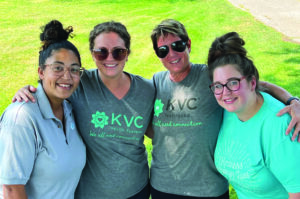Foster Parent Appreciation

 May is National Foster Care Month — And we’re taking time to shower foster parents with the love and appreciation they most certainly deserve. KVC Nebraska is reflecting on the important role that foster parents play in the lives of fostered youth, and how important it is for foster parents to receive the support they need.
May is National Foster Care Month — And we’re taking time to shower foster parents with the love and appreciation they most certainly deserve. KVC Nebraska is reflecting on the important role that foster parents play in the lives of fostered youth, and how important it is for foster parents to receive the support they need.
Annesia Thompson, Foster Parent Recruiter with KVC Nebraska, shares insight into the life of a foster parent and the requirements of caregiving. And to show appreciation to foster parents, we’re also diving into what makes someone a good fit for fostering and encouraging everyone to find ways to support a caregiver.
The Role of a Foster Parent
Children enter into the foster care system for a variety of reasons. Many of these children have endured an unsafe home environment at no fault of their own. In essence, foster parents have the honor and duty to provide a safe and supportive home for the children in their care.
In many cases, foster care is a temporary situation: Reunification is the goal. The foster family must be prepared to meet the needs of a foster child while in their care. This includes taking on the day-to-day duties of the child along with other responsibilities. These regular responsibilities of a foster parent include:
- Ensuring a safe environment where the child can thrive
- Being a full-time caregiver
- Transporting to and from school or childcare
- Bringing the child to outside school activities (including therapy, doctor appointments and other services)
- Providing meals
- Helping with homework
- Doing anything necessary to fulfill the child’s needs
Additional Responsibilities of Fostering a Child
Caregivers deserve to feel appreciated and supported because, on top of their regular parenting activities, other duties are required. Since reunification with the child’s biological family is a top priority for everyone involved, foster parents must work with the child’s biological family and foster professionals regularly. Other requirements outside of day-to-day parental activities include:
- Planning visitations or overnight visits with the biological family
- Contacting and introducing themselves to the child’s biological family within 24 hours of placement
- Making sure their training is completed or renewed
- Checking in with the agency and case managers or specialists throughout the placement
Requirements to Become a Foster Parent
How does the process of becoming a foster caregiver begin? Before someone can begin fostering a child, initial requirements must be met. Even though foster parents are in high demand, certain requirements are necessary to allow potential caregivers to attain their licenses. Foster parents in Nebraska must:
- Be 21 years or older
- A United States resident
- Have additional income outside of foster care reimbursement
- Provide a bedroom that meets building codes
- Have reliable transportation
- Pass a background check (Those with past legal issues are still encouraged to apply, and approval is dependent on the individual situation)
- Complete the free 11-week course through KVC that is necessary for foster parents to finish their registration and licensing
What Makes Someone a Good Fit for Fostering Children?
 Many children entering the foster system come from environments where they’ve experienced trauma or abuse of varying degrees. Therefore, foster parents who rely on gentle caregiving and avoid being too rigid or harsh may find better success when bonding with the children in their care. Some of the healthiest foster relationships are built on a stable foundation of patience, consistency, honesty and reliability.
Many children entering the foster system come from environments where they’ve experienced trauma or abuse of varying degrees. Therefore, foster parents who rely on gentle caregiving and avoid being too rigid or harsh may find better success when bonding with the children in their care. Some of the healthiest foster relationships are built on a stable foundation of patience, consistency, honesty and reliability.
Thompson describes a good foster parent as “someone who understands that the youth have gone through trauma (some more than others) and realizes that the behaviors or lack of trust come from past experiences.”
She notes that these children are in the foster care system through some crucial transformative years, and foster parents can serve children well by having “patience to help the kids grow.”
Ways to Support a Foster Parent
Foster parenting is not a fit for everyone, but those that cannot become foster parents can still make a difference by supporting caregivers. How can you support other foster parents in your community?
1. Donate
One of the most simple ways of showing support to foster parents is with donations. Children in the foster system don’t always come with the necessary items for daily life, and the responsibility to get those items falls onto the foster parents. Donations come in many forms and can include monetary donations to help parents purchase necessary items, as well as item donations like clothing items, shoes and hygienic supplies. Donations made to KVC Nebraska help support foster families in need.
2. Encourage
The path of fostering a child can feel different than parenting your own children. Foster parents need the support of their friends and family. Support is as easy as a quick check-in or can be as involved as inviting the family over for a barbecue or babysitting while the foster parents have dinner out. Either way, this calling is important, and interest and encouragement go a long way toward the success of foster parenting.
3. Spread Awareness
Becoming aware and bringing awareness to foster care is a great way to support foster families. By gaining knowledge and sharing it with others through word of mouth or with social media channels like Facebook, Instagram and Twitter, the public is better informed and perhaps more willing to show their support for foster parents and fostered youth. This positive cycle might just inspire another group of parents to foster a child in need.
4. Advocate for the Foster Care System
Helping a child in foster care begins with learning more about the foster care process and staying informed on the challenges vulnerable families are facing in your community. Educating yourself and sharing with those in your circle spreads awareness and helps create a ripple effect of support for both children in foster care and the caregivers.
5. Provide Respite Care
Respite care allows the foster parents/family a short-term break from the necessary responsibilities that come with fostering a child. This time away can last a day, a few days or a week, as long as the children are with a responsible party. Respite care providers can be other licensed foster parents or members of the foster family who have bonded well and become familiar with the foster children.
KVC Nebraska Supports Foster Parents
 KVC understands the big role foster parents play in the lives of the young people in their care. “Take the time to make a foster parent feel like what they’re doing is important,” Thompson advises. Along with the free training, 24-hour phone support, child health insurance, local resource assistance, monthly reimbursement and other available services, KVC wants foster parents to feel seen and heard along their foster care journey.
KVC understands the big role foster parents play in the lives of the young people in their care. “Take the time to make a foster parent feel like what they’re doing is important,” Thompson advises. Along with the free training, 24-hour phone support, child health insurance, local resource assistance, monthly reimbursement and other available services, KVC wants foster parents to feel seen and heard along their foster care journey.
The caregiver journey is filled with challenges, growth opportunities and beautiful rewards. If you are ready to take the step to become a foster parent or would like to get more information before diving in, check out these FAQs or contact a KVC Professional today.


